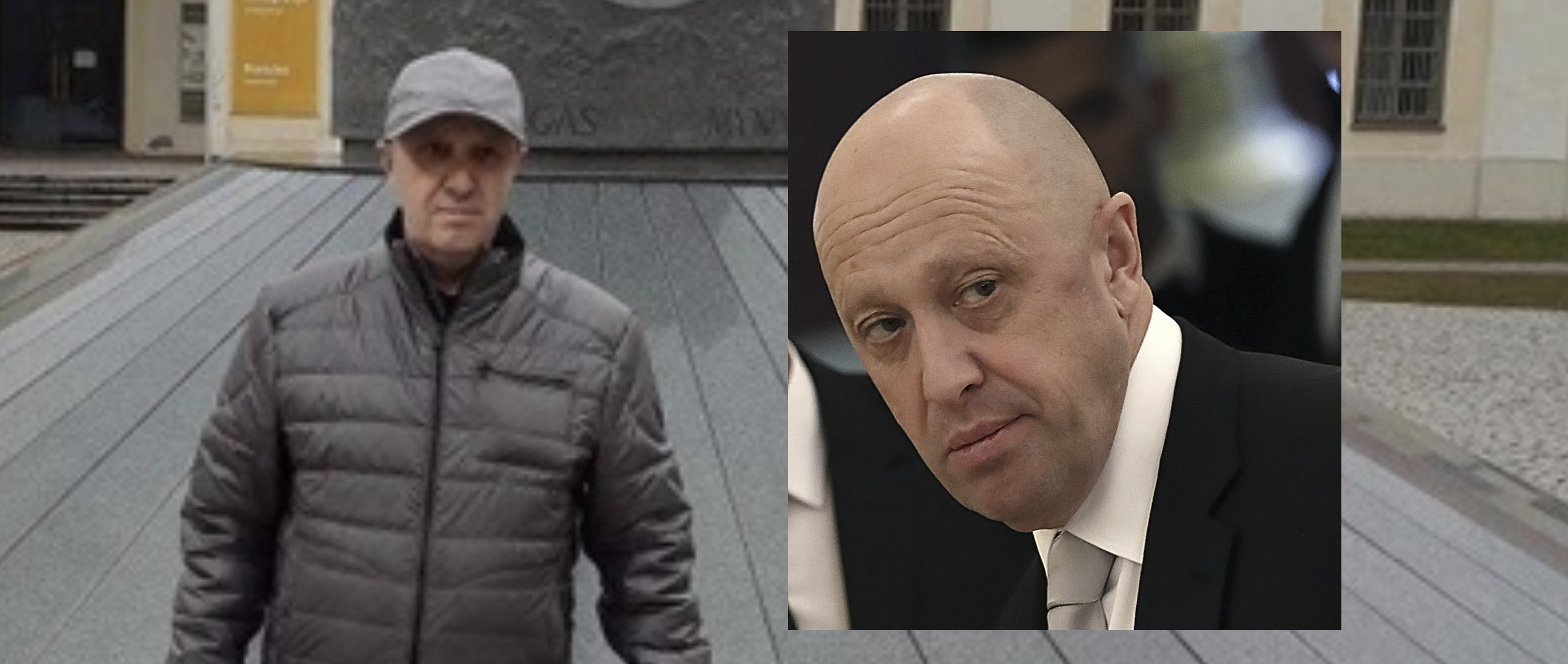
BANNER: Left: Prigozhin impersonator photographed in front of the Lithuanian National Museum, one of several images of the impersonator distributed by Russian media. Right: file photo of Evgeny Prighozin at the Kremlin, July 4, 2017. (Sources: Delovaya Gazeta and REUTERS/Sergei Ilnitsky/Pool)
Russian online media outlets targeted Lithuania with a disinformation campaign claiming Yevgeny Prigozhin, an oligarch close to the Kremlin, had been let into the country. In reality, the man these outlets presented as Prigozhin was an impersonator, who, according to a new report by Lithuania’s intelligence services, made two visits to Lithuania in 2020.
Prigozhin, often referred to as “Putin’s Chef,” is the founder of Russia’s infamous Internet Research Agency, the state-backed troll farm accused of interfering in the 2016 U.S. presidential election, as well as targeting Europe and Africa; and Wagner Group, a private military company that has been involved in the Kremlin’s campaigns in Ukraine, Syria, and various countries in Africa.
The United States and European Union have imposed sanctions on Prigozhin for some of his activities. At the end of February 2021, the FBI added Priogzhin to its Most Wanted list for his alleged “conspiracy to defraud the United States” from 2014 to 2018 and announced a $250,000 reward for any information leading to his arrest. The DFRLab has previously covered Prigozhin’s meeting with Libyan warlord Khalifa Haftar, his involvement in the creation of the Internet Research Agency, and the activities of Wagner mercenaries.
Prigozhin impersonator fails to trick Lithuania
According to the annual report released by the Lithuanian State Security Department (VSD), a person resembling Prigozhin made two trips to Lithuania in early 2020. The person held a Russian passport issued in the name of “Yevgeniy Prigozhin” with Prigozhin’s birth date on it.
As outlined in the report, the Prigozhin impersonator made his first trip to Lithuania on February 13, 2020. The impersonator went straight to the country’s Transport Ministry in the capital of Vilnius. He took a photo in front of the building and went back to the airport to return to Russia. He spent only five and a half hours in Lithuania.
The impersonator made his second trip on February 26, 2020. This time, he took photos of the Lithuanian Parliament, the National Museum and the Palace of the Grand Dukes of Lithuania. He did not take his return flight scheduled for the same day but left for Belarus by train the following day.
Darius Jauniškis, head of the VSD, stated that border control did not identify the man as the same Prigozhin who is on the sanctions list, as some of his personal information did not match, and he was subsequently let into the country.
Lithuania’s intelligence services believe that the goal of this operation was to undermine trust in the country’s international commitments, portray Lithuania as an unreliable partner and “expose” loopholes in the Schengen border control system.
Russian outlets spread lies about Prigozhin’s supposed visit to Lithuania
On February 27, 2020, a day after the Prigozhin impersonator’s second visit to Lithuania, Russian online outlet sobesednik.ru published an article where it claimed that Prigozhin had once again come to Lithuania and visited parliament despite being on the E.U. sanctions list. The article included a photo of the man outside of the Lithuanian parliament. It claimed that the photo was posted on Facebook; however, the photo was deleted from the platform later.
Sobesednik.ru also referred to a prior article, stating that Prigozhin had visited Lithuania before, and held a meeting with the vice minister of the Transport and Communications Ministry. The Lithuanian intelligence report denied that the impersonator had any meetings with state officials “mentioned in the fake news published on Russian media.”
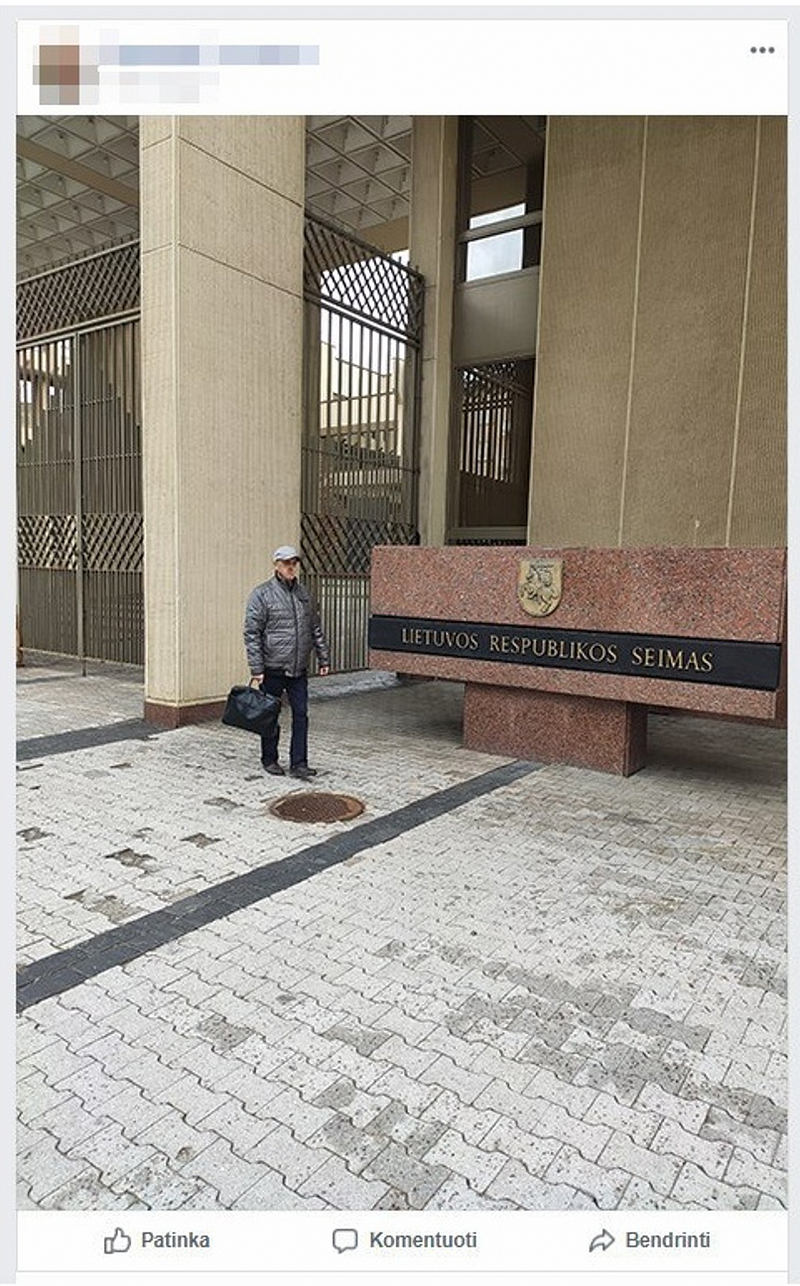
A Yandex reverse image search for the photo used by sovesednik.ru showed multiple websites containing this image. They belonged to various Russian fringe outlets, all of which spread the same falsehood about “Prigozhin’s visit” to Lithuania.
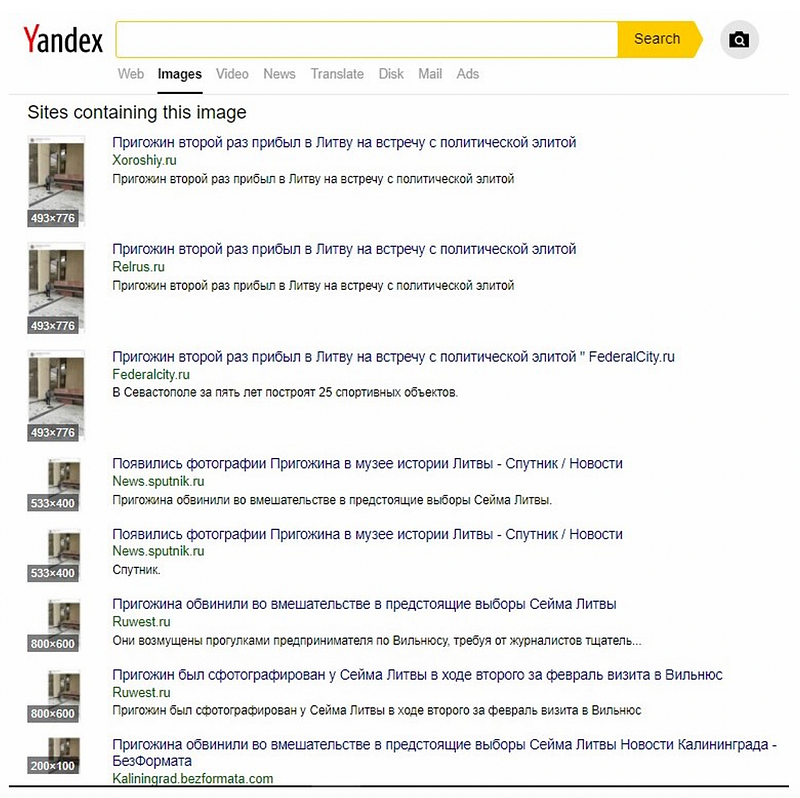
Following the sobesednik.ru article, on February 28 and 29, 2020, several other Russian fringe news websites reported on the faux Prigozhin’s visit to Lithuania. The articles on the websites referred to sobesednik.ru as the original source of the information and insisted that Prigozhin was able to move freely throughout Lithuania despite being on the sanctions list. These pieces included headlines such as “Sanctions did not prevent businessman Prigozhin from visiting Lithuania for the second time in February,” “Prigozhin was photographed at the Lithuanian Parliament during his second visit to Vilnius in February,” and “Prigozhin arrived in Lithuania for the second time to meet with the political elite.”
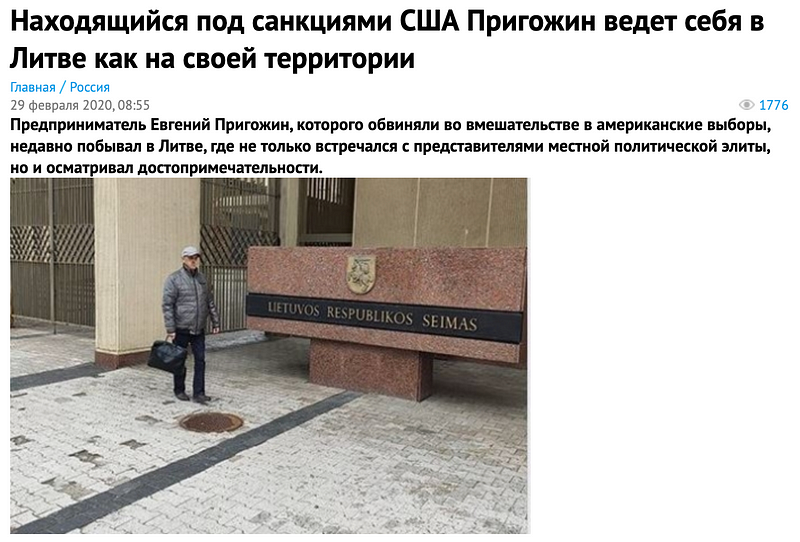
Lithuanian media coverage
Lithuanian media outlets were not affected by the information campaign about Prigozhin‘s supposed visits to Vilnius. The vast majority of articles about Prigozhin in February 2020 focused on another incident involving Prigozhin‘s plane, which was photographed landing at Vilnius International Airport, reportedly for technical support. Prigozhin was not reported to be on the plane at the time. These stories appeared on main Lithuanian media outlets on February 9 and February 13, as photos of Prigozhin’s plane were taken at the airport. According to the story, two Russian nationals and the flight crew on the plane were not under sanctions and thus had the right to enter the Schengen zone.
This story sparked a scandal that received reactions from members of the Lithuanian Parliament, who criticized Avia Solutions Group, the Lithuanian company that was the most likely candidate to provide the repair services. Avia Solutions Group called these claims speculation, and the story quickly died out, with no significant follow up until March 2021. Focused searches did not provide any results; neither did reverse image searches of the surfaced pictures. The usual disinformation suspects in Lithuania, including pro-Kremlin outlets, did not pick up on the topic either. Sputnik News Lithuania published only a single article on February 10, 2020 on the incident.
Additionally, social media listening tools Buzzsumo and CrowdTangle were used to measure the broader impact. Keywords “Prigožinas“ and “Prigožino“ in the period between January 31, 2020 and April 30, 2020 provided little to no results. The limited results that were identified by the software were all published by mainstream media outlets.
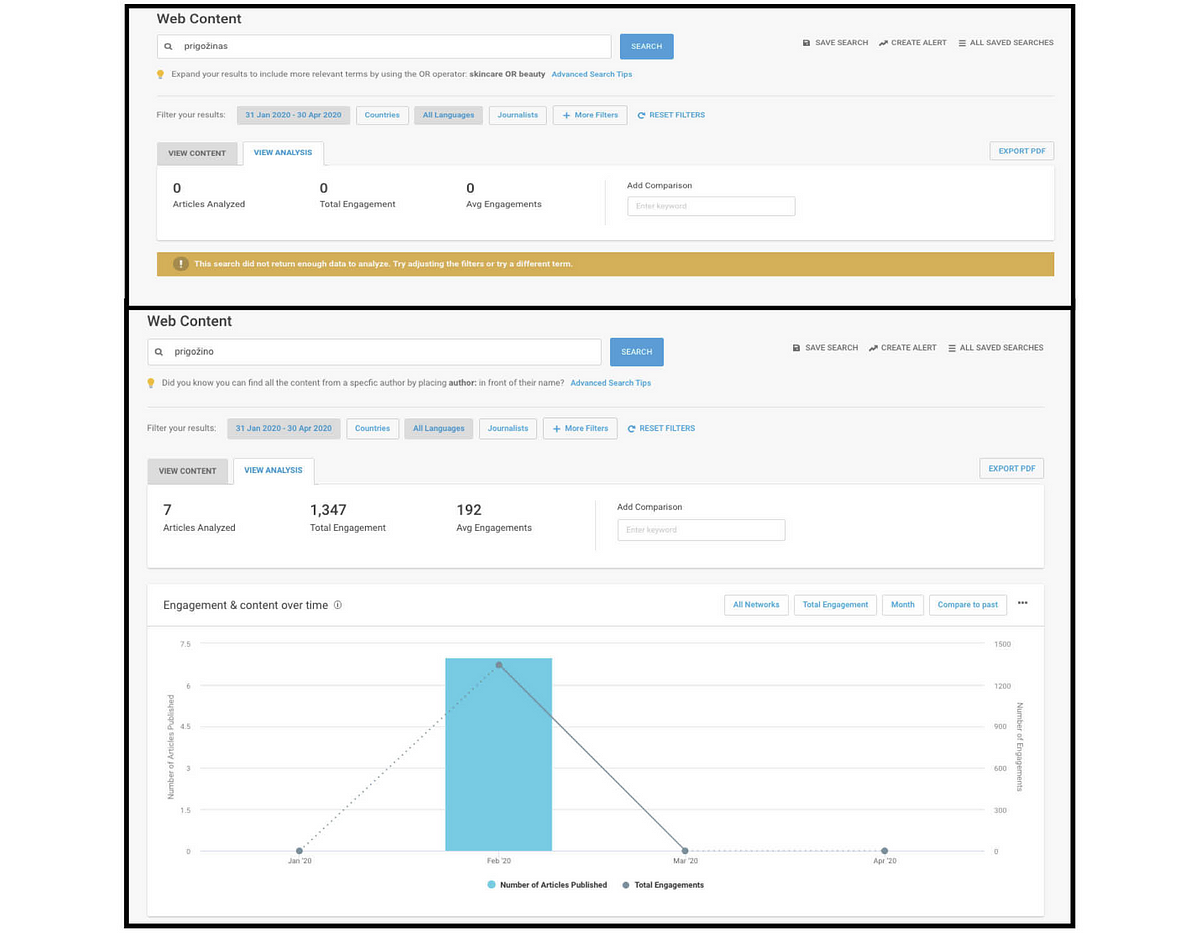
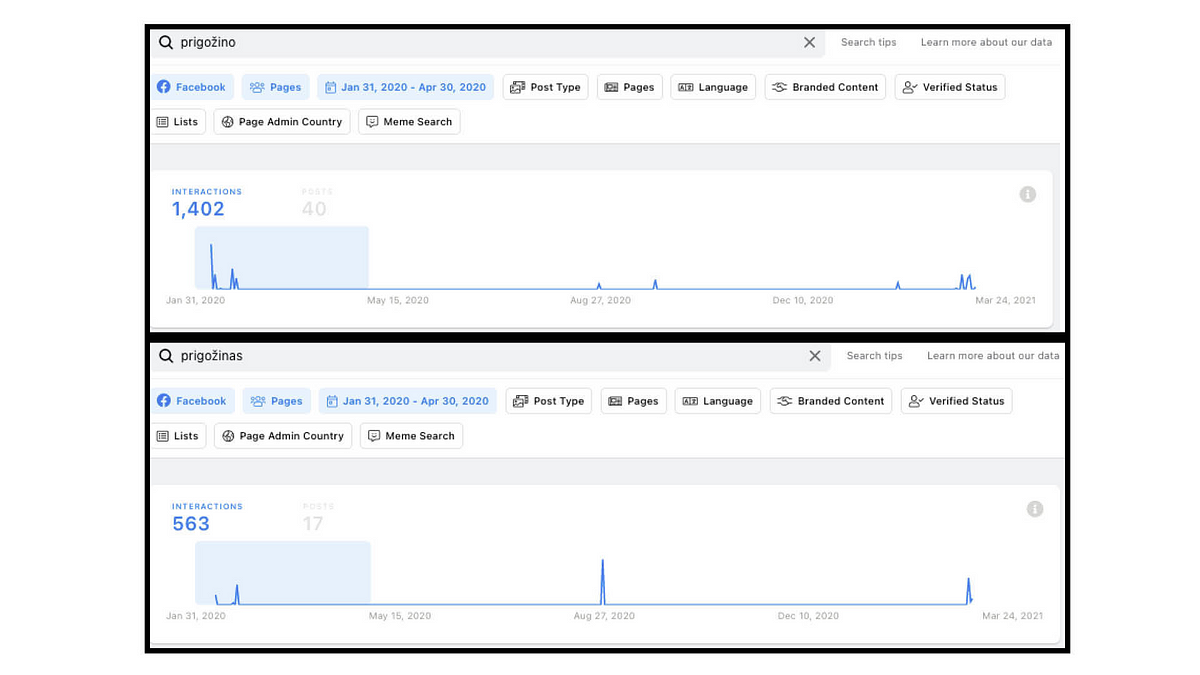
The story about the visits by Prigozhin’s body double appeared on Lithuanian media outlets only in March 2021, when the Lithuanian intelligence community presented its assessment. These findings show that the rumors of Prigozhin’s supposed visit were not picked up by Lithuanian media, perhaps because the media campaign was not conducted in Lithuanian, but in Russian, which suggests it was primarily aimed at Russian-speakers.
Cite this case study:
Eto Buziashvili and Lukas Andriukaitis, “Russian media targeted Lithuania using Yevgeny Prigozhin impersonator,” Digital Forensic Research Lab (DFRLab), March 31, 2021, https://medium.com/dfrlab/russian-media-targeted-lithuania-using-yevgeny-prigozhin-impersonator-351b5ed0183f.

